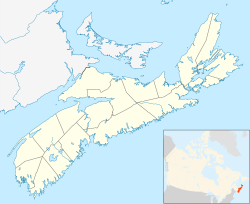History
Port Greville was the location of the construction of many sailing ships used in trade mainly with the American New England states. Many sea captains came from the area with names such as Wagstaff, Pettis and Merriam.
One such vessel was the three masted schooner 'Minas King', captained by George Merriam with his cousin J.Randall Merriam operating as first mate. Randall Merriam later became a Master Mariner (inland waters) and captained several of the Canadian National ferries operating between Cape Tormentine New Brunswick and Borden PEI.
Lighthouse
Port Greville's lighthouse was built in 1907 along Wagstaff Road, where it overlooked the harbour. [1] After the Wagstaff-Hatfield Shipyard closed in the 1970s, traffic in the harbour decreased and the lighthouse was no longer necessary. After being discontinued by the Coast Guard, the lighthouse was removed from its original location in 1981 and taken to Cape Breton Island, where it became a decorative feature at the Coast Guard College in Westmount.
After the Age of Sail Museum opened in 1994, community members formally requested to have the lighthouse returned to Port Greville. The Coast Guard brought the lighthouse back to the community in 1998. It currently sits on the grounds of the Age of Sail Museum.
This page is based on this
Wikipedia article Text is available under the
CC BY-SA 4.0 license; additional terms may apply.
Images, videos and audio are available under their respective licenses.

